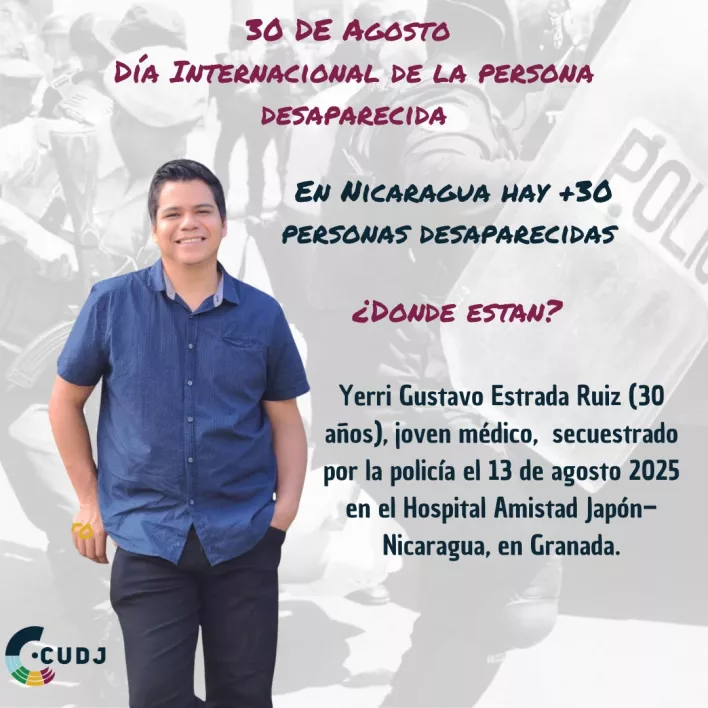That day, anguish, pain, sadness, and worry overwhelmed these families when the news arrived that the body of Carlos Cárdenas Zepeda, who had been missing, had been returned lifeless. Less than a week earlier, this was the second political prisoner to die, the first being Mauricio Alonso Petrie. Both had fallen victim to recent waves of arrests and were in a state of forced disappearance. Mauricio Alonso had been arrested along with his wife and son on 18 July 2025, while Carlos Cárdenas was detained in mid-August.
The Mechanism for the recognition of political prisoners in Nicaragua published the same day an updated report that records 73 people detained for political reasons, of which 33 are reported as missing. According to the Report:
Overall, between July and August, 52 arbitrary detentions were recorded, of which 11 individuals were released and 19 were added to the official list of political prisoners, bringing the total to 73 people recognised by the Mechanism. The remaining cases are still undergoing verification. The majority of those detained are community leaders and individuals with high social standing in their neighbourhoods, further supporting the regime’s strategy of dismantling social organisation and weakening community trust.
The report also states that the arrests in recent months are not isolated incidents but part of a wider policy of repression.
During July and August, the country experienced a heightened crackdown involving widespread raids, police harassment, arbitrary arrests, and seizures of social and educational institutions. These actions illustrate a pattern of state violence aimed at instilling fear in the population and punishing any dissent.
The organizations accompanied by PBI-Nicaragua have reported and condemned these waves of arrests. One of the activists advocating for the release of political prisoners is feminist defender Sadie Rivas, member of the Coordinadora Universitaria por la Democracia y la Justicia (CUDJ, University Coordination for Democracy and Justice), whose father, Aníbal Rivas Reed, has been imprisoned since last May. At the Press Conference on 30 August, Sadie Rivas, speaking on behalf of the families seeking justice and freedom for family members who are political prisoners, expressed:
For months now, dozens of Nicaraguan households have been enduring the constant anguish of not knowing where our loved ones are or what conditions they are in. (…) We refuse to accept this disgraceful practice as normal, and we strongly and firmly condemn every death in State custody, considering it a political assassination.
Sadie Rivas also recalled that many families undertake searches from forced exile because they are people like her who were compelled to leave the country due to persecution. This makes searching for information even more challenging because of the distance and the difficulties of migration. For this reason, she demands that the Nicaraguan State respond to the families in exile.
The CUDJ has joined the Campaign for the Release of Political Prisoners by supporting not only Sadie Rivas and her family, but also by highlighting the detention of Yerri Gustavo Estrada Ruiz, a young 30-year-old doctor, who was their colleague in the 2018 protests when they were all university students in Nicaragua. Yerri is also missing.

CUDJ image calling for the liberation of the young doctor Yerri Gustavo Estrada Ruiz (30 years old) allegedly kidnapped by the police on 13 August 2025 in the Amistad Japón-Nicaragua Hospital, in Granada, Nicaragua.
The Grupo de Reflexión de Excarcelados Políticos (Reflection Group of Former Political Prisoners, GREX) has launched a campaign on social media with the question “Where are they?” highlighting the faces and names of the missing persons. GREX is a group composed of individuals who were imprisoned for political reasons following the social unrest of 2018. For over five years, it has continued to demand the freedom of those who remain detained, has supported their families, and called for better conditions and respect for the rights of those imprisoned.
In 2024, within the framework of the Universal Periodic Review (UPR), GREX presented a report documenting ongoing violations faced by political prisoners even after their release. One of the most serious and well-known is denationalisation, but for those remaining in Nicaragua, persecution persists. Consequently, many are forced to exile to avoid re-arrest. According to GREX records, there are currently six individuals in Nicaraguan prisons who have been previously imprisoned and subsequently released.
Nicaraguan organisations and defenders call for the immediate and unconditional release of all political prisoners, the safe return of all disappeared persons, respect for the lives and dignity of prisoners, and accountability for those responsible for the arrests and deaths. They also demand justice, so that these human rights violations are not left unpunished and that reparations are made to the families of those killed.
They have also urged the international community not to remain silent, to keep raising their voices and demanding the release of prisoners in Nicaragua, and not to avert their gaze on the grave human rights situation in the country.
The press conference can be viewed in its entirety in Spanish here.
